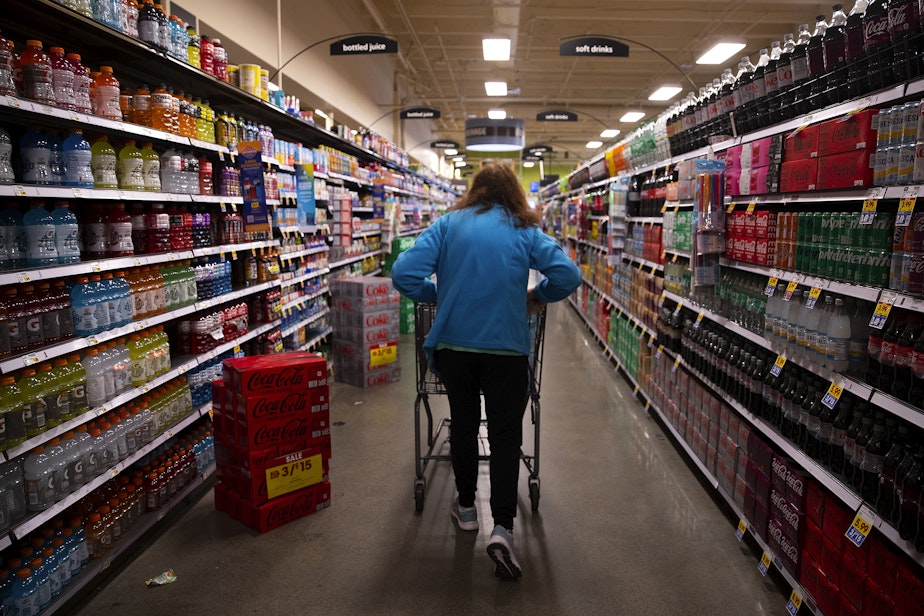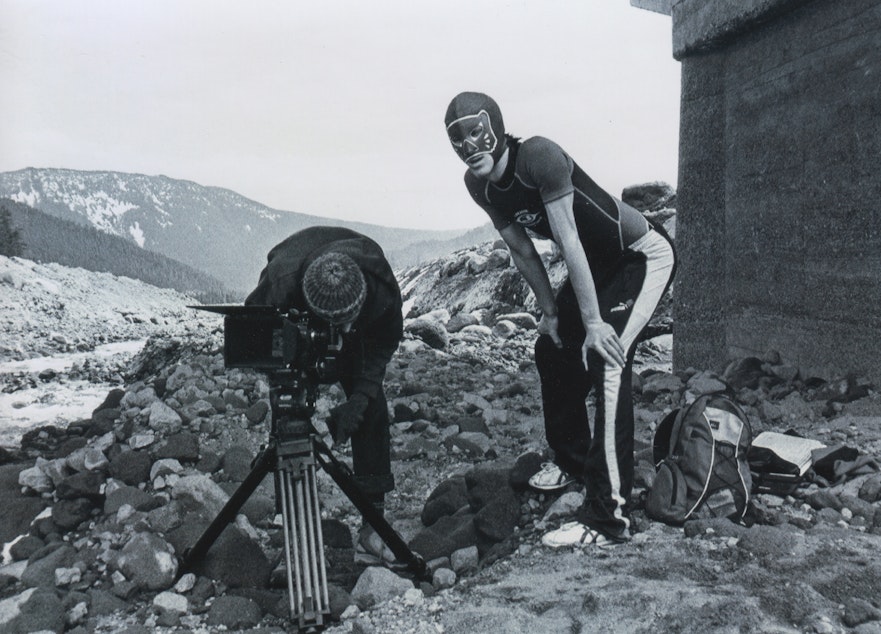Lost in the supermarket merger: Today So Far

KUOW looks into the "State of the Cart" as the grocery business evolves, customer habits change, employees are in the middle, all as Kroger and Albertsons attempt a massive corporate merger.
This post originally appeared in KUOW's Today So Far newsletter for May 10, 2023.
Many years ago, I was in an interview for a job at the Borders Books in downtown Portland. At one point the hiring manager pointed to my application.
"I was looking for a reference, but I see that you worked at Washington Mutual, and Hollywood Video, and another video rental store before that," he said, pointing to the retail experiences I had at companies that had since gone bankrupt and no longer existed.
"Yeah, they're not around anymore, but I do have numbers for you," I said. "And I promise you, I'm not bad luck!"
We laughed and I ended up getting the job. Two weeks later, they announced that the downtown Portland Borders was closing.
A lot of companies go down because of bad business decisions, especially during times of changing technology and customer habits. I watched some bad decisions in real time at some former employers. As I read Ruby de Luna's recent series, "State of the Cart," I can't help but think that the grocery industry is in the middle of such a time, and company leaders are now trying to make the best decisions so they don't go the way of Hollywood Video. At the same time, there are the customers to consider.
Sponsored
For Kroger and Albertsons, the decision is to merge, but it hasn't come without criticism. The two grocery giants want to combine forces to better withstand the competition from the likes of Walmart, Target, and Amazon. A big issue here is that online ordering is a growing customer preference. If I'm being honest, I'm one of those customers who likes ordering groceries on an app and having them delivered.
Diane Martin Rudnick would disagree with me. She tells KUOW that shopping at Fred Meyer is an adventure, watching for discounts, finding new food, making the best deals. My wife Nina is a big fan of Costco — a big fan. For years, as a single guy, I never understood Costco. There was never any way I was going to eat that much broccoli. Now, with a wife, a ma-in-law, and a dog, I've started to come around. Still, for Nina, a Costco trip is about wandering and exploring, and I still feel there are better things to be doing with my time than scanning aisles. Though, one thing I can relate to with Diane and Nina is hunting for the best deals. That usually involves a multi-store strategy across Costo, Freddies, Safeway, Trader Joe's, and more.
Many worry that if Kroger and Albertsons merge, better deals and unique finds will be harder to come by. Access to food is another consideration. Albertsons also owns Safeway. Kroger operates Fred Meyer and QFC, among others. That's a lot of grocery brands moving under one company, which could control prices and products across them all. When Albertsons bought out Safeway in 2015, communities noticed a change. Many stores closed as a result. Bellingham's Birchwood neighborhood lost its Albertsons, causing a food desert to emerge. Locals have since organized a weekly food share program to help ease the strain.
On one side of this there are grocery companies aiming to keep up with the times. It's likely that more and more people will be ordering groceries online moving forward. This is going to happen. Just as Netflix changed the video rental industry, social media changed news media, and Amazon changed just about everything else in our lives, grocery companies are faced with important decisions as the business evolves. Back in the day, the video store trip was an experience, but it couldn't hold up against convenience and now there are no more Hollywood Videos. Amazon carved into the bookstore market, and many stores didn't survive the online revolution, or were forced to adapt to the Amazon way. I think these lessons from history are on the minds of grocery store officials these days.
On the other side of this are people who aren't going to, or cannot, move their shopping habits online. Some simply cherish their neighborhood store and the community that crosses paths there. When QFC closed in Wedgwood, it left a massive hole in that neighborhood. When Albertsons closed in Birchwood, it created a food desert. And as much as I personally like ordering groceries online, I have to admit that there is something lost. Going to a video rental store was superior to watching movies on Netflix. It just was. Don't believe me? Go stream the classic, critically-acclaimed Northwest series "Northern Exposure" right now. Or perhaps try "Dogma," "Cocoon," "Spice World," "The Abyss," or any episode of the iconic series "Xena: Warrior Princess." Good luck with that.
Sponsored
In the middle are many store employees.
For many, going to the grocery store is a trip that cannot be replaced. Plus, whoever fulfills my online grocery orders isn't going to reach way into the back of the produce shelf in search of longer expiration dates. Sometimes you need that extra two days for bagged salad. Also, I have to walk into a grocery store in order to invest in my retirement ... which is what I call buying scratch tickets.
Ruby's State of the Cart series continues through this week, exploring the customer experience, grocery mergers, online shopping, and more. Stay tuned to the series here as it continues to publish.
AS SEEN ON KUOW

Sponsored
Sam Harkness, age 19, dressed as his alter ego The Blue Panther on Mt. Hood in Oregon, 2005. For years, Reed Harkness made films with his younger half-brother, Sam. Reed kept his camera rolling when their mother, Jois, disappeared, leaving behind her sons. Reed continued filming over decades, as Sam and the rest of his family grappled with Jois’ decision to leave without a word. Now that 25-plus year journey has been released as a documentary called "Sam Now." (Harkness Family)
DID YOU KNOW?
The concept of a lawn is just something I will never understand. To me, grass is a resource-hogging, useless use of space (OK, sure, it does give us oxygen, so I suppose that's cool). For others, it's an obsession and part of their landscaping art. It is for these people that the lawn mower was invented. As warmer weather and sun emerges, the season of grassy glory begins.
The first lawn mower was patented in 1830 in England. It was designed for sports fields, not front yards. Folks quickly started improving upon the idea. Steam-powered mowers and animal-pulled mowers emerged. On May 9, 1899, inventor John Burr patented an improved design for a rotary lawn mower, which solved the problem of mowers getting clogged with clippings. It also allowed for more precise cuts and the ability to mow lawns right up alongside buildings. Parts of this design went on to be included in lawn mower products for decades, which produced hefty royalties for Burr. Humanity's obsession with grass has never let up. Today, we have autonomous, robotic lawn mowers.
In 1871, the first lawn sprinkler was patented in the USA; another invention created for our obsession with grass (and growing crops). It would take about 100 years before it became an annoying dance.
Sponsored
ALSO ON OUR MINDS

Inflation stayed high last month, compounding the challenges facing the U.S. economy
Inflation remained stubbornly high last month after more than a year of rising interest rates. Consumer prices in April were 4.9% higher than a year ago, a slight slowdown from the 5% inflation rate in March. It was the smallest annual cost-of-living increase in two years. Prices rose 0.4% between March in April, with prices for housing, gasoline and used cars leading the way.

